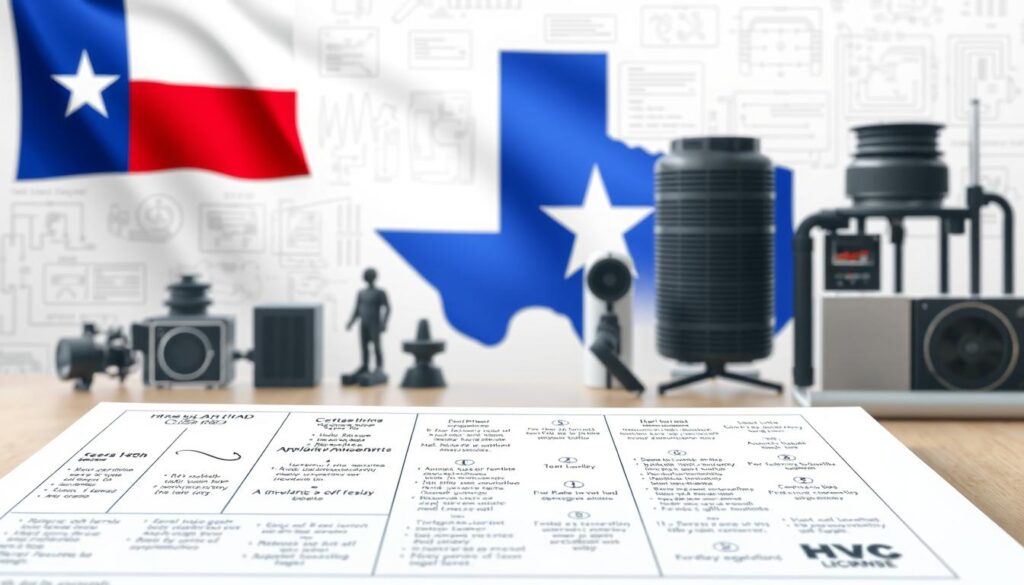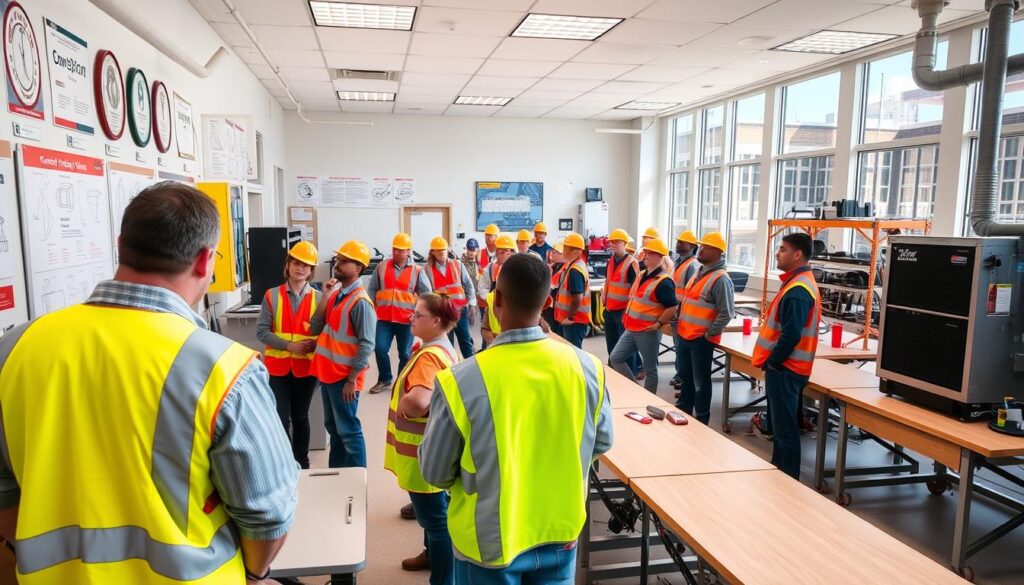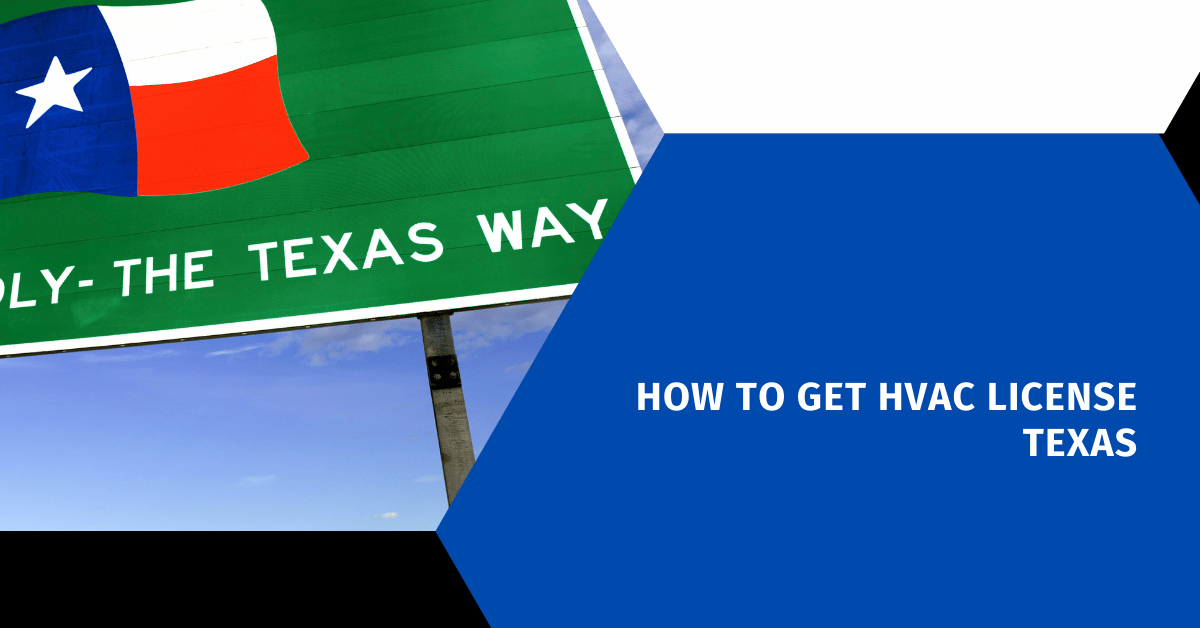Affiliate Disclosure
HVAC Guide Guys is a participant in the Amazon Services LLC Associates Program, an affiliate advertising program designed to provide a means for sites to earn advertising fees by advertising and linking to Amazon.
How to Get HVAC License Texas? Being a licensed HVAC professional in Texas opens many doors. It’s important whether you’re just starting or growing your business. The TDLR makes sure contractors are skilled and safe.

Getting an HVAC contractor license in Texas needs careful planning and knowing state rules. The Texas Department of Licensing and Regulation (TDLR) has clear guidelines for HVAC licenses. This guide will walk you through the key steps and requirements for your HVAC contractor license in Texas.
Key Takeaways
- TDLR is the primary governing body for HVAC licensing in Texas
- Multiple license classes are available for HVAC professionals
- Comprehensive documentation and experience are required
- Passing both written and practical examinations is mandatory
- Ongoing education and license renewal are essential
- Different endorsements exist for specialized HVAC work
- Background checks are part of the licensing process
Table of Contents
Understanding HVAC Licensing Requirements in Texas
Getting to know the Texas HVAC license rules can be tricky. But, it’s key to grasp the different types of licenses. Texas has special licenses for different skill levels and career goals.
Looking into HVAC licenses in Texas, you’ll find two main types. They show what you can do professionally:
- Class A License: Lets you work on all HVAC systems
- Class B License: Has limits on the size of systems you can work on
Exploring License Endorsements
There are also special endorsements for Texas HVAC licenses. They let you grow your skills in areas like:
- Environmental Air Conditioning
- Commercial Refrigeration
- Process Cooling and Heating
“Choosing the right HVAC license type can significantly impact your career trajectory in Texas.” – Professional HVAC Association
Basic Eligibility Criteria
To get a Texas HVAC license, you must meet certain criteria. These include:
- Being at least a certain age
- Having a clean criminal record
- Showing enough work experience
- Passing required exams
Knowing about these license types and endorsements is crucial. It helps you plan the best HVAC career path in Texas. Each license class opens up different chances to show your skills and knowledge.
Experience Requirements for Texas HVAC Contractors
To get an HVAC license in Texas, you need to show you’re skilled. The state has rules for contractors to prove their abilities.
There are two main ways to meet the experience needs:
- 48-Month Practical Experience Path: You need 48 months of work in air-conditioning and refrigeration in the last 72 months.
- Certification and Experience Combination Path: Or, you can qualify with 36 months of experience if you have a technician certification for 12 months.
It’s important to document your experience for your license. You’ll need to fill out an Experience Verification Form. This form should include:
- Employer details
- Job responsibilities
- Duration of employment
- Specific HVAC tasks performed
Tip: Keep detailed records of your work experience to make the licensing process easier.
Some people might qualify through other ways, like education or military training in HVAC. These can sometimes let you meet the experience needs differently.
Make sure you know what documents you need to prove your experience. Having the right documents will help your licensing application go smoothly in Texas.
Explore Our HVAC Shop
Looking for top-rated HVAC tools, parts, and accessories? Visit our shop and find the perfect solution for your needs.
Visit the ShopHow to Get HVAC License Texas: Step-by-Step Process
Getting an HVAC license in Texas needs careful steps and knowing the rules. This guide will help you through each step to get your HVAC license.
Application Submission Guidelines
The first step is to get all your documents ready. You must fill out the application form from the Texas Department of Licensing and Regulation (TDLR).
- Download the official application form online
- Carefully review all instructions
- Ensure all information is accurate and complete
- Prepare supporting documentation
Required Documentation
To apply for your Texas HVAC license, you need to submit important documents. These show you’re qualified:
- Proof of work experience
- Valid government-issued identification
- Verification of completed training or education
- Proof of insurance coverage
Fee Structure and Payment Methods
Knowing the fees for your Texas HVAC license is key. The application has specific costs you must pay.
| Fee Type | Amount | Details |
|---|---|---|
| Initial Application Fee | $115 | Standard license processing |
| License Validity | 1 Year | From date of issue |
| Accepted Payment Methods | Multiple | Credit Card, Check, Online Payment |
Pro tip: Make sure to double-check your payment details. Keep records of your payment for later. The HVAC license application process needs careful attention to succeed.
Explore Our HVAC Shop
Looking for top-rated HVAC tools, parts, and accessories? Visit our shop and find the perfect solution for your needs.
Visit the ShopEducational and Training Prerequisites

Starting a career in HVAC needs careful planning. Texas has many ways to meet HVAC education needs through training programs.
HVAC training in Texas offers great learning chances for future technicians. These programs teach key skills and knowledge for success in the field:
- Technical system understanding
- Refrigeration principles
- Electrical systems
- Climate control technologies
There are several ways to start your education. Community colleges and technical schools in Texas have strong HVAC certification programs. Accredited places like Houston Community College and Texas State Technical College have special courses to help you get certified.
Important educational steps for HVAC licensing include:
- Associate’s degree in Air Conditioning and Refrigeration Technology
- Professional certification from recognized trade schools
- Diploma programs in HVAC systems
- Specialized vocational training certificates
Many employers and licensing boards value these educational achievements. By choosing quality HVAC training in Texas, you show dedication. You also gain essential technical skills for your career.
Insurance Requirements and Coverage Details
Understanding HVAC contractor insurance in Texas is key. It’s about protecting your business. You need to know the right coverage for your license and operations.
Meeting Texas HVAC insurance needs is vital. It keeps your professional status safe and protects your business from risks. Each license class has its own insurance needs.
Minimum Coverage Amounts
The Texas Department of Licensing and Regulation (TDLR) sets insurance rules. These rules depend on your license type:
| License Class | Per Occurrence Coverage | Aggregate Coverage |
|---|---|---|
| Class A | $300,000 | $600,000 |
| Class B | $100,000 | $200,000 |
Insurance Provider Qualifications
Choosing the right insurance provider is important. Look for these qualities:
- Licensed to operate in Texas
- Proven track record in commercial liability insurance
- Specialized experience with contractor coverage
- Ability to provide comprehensive documentation
Documentation Requirements
Meeting Texas HVAC insurance needs requires proper documents. You’ll need to submit:
- Completed Certificate of Insurance
- Proof of minimum coverage amounts
- Endorsements specific to HVAC operations
- Current insurance provider contact information
Pro tip: Always keep multiple copies of your insurance documentation and update them promptly when changes occur.
Explore Our HVAC Shop
Looking for top-rated HVAC tools, parts, and accessories? Visit our shop and find the perfect solution for your needs.
Visit the ShopExamination Process and Preparation

To pass the HVAC license exam in Texas, you need a solid plan and lots of study. The Texas Department of Licensing and Regulation (TDLR) has clear rules for getting ready for the exam. It’s important to follow these rules closely.
Getting your HVAC technician license means you must know a lot. The exam tests your technical knowledge and practical skills. These are key for being certified.
- Understanding exam content domains
- Developing effective study strategies
- Practicing with sample test questions
- Reviewing technical and practical skills
Preparing for the HVAC exam takes a lot of effort. You’ll need to show you know about electrical systems, refrigeration, heating, and safety. These are all important areas to focus on.
| Exam Component | Percentage of Test | Key Focus Areas |
|---|---|---|
| Electrical Systems | 25% | Circuits, Wiring, Control Mechanisms |
| Refrigeration | 30% | Cooling Cycles, Compressor Functions |
| Heating Technologies | 25% | Furnace Operation, Heat Transfer |
| Safety Regulations | 20% | OSHA Standards, Equipment Handling |
To do well, use good study materials, go to workshops, and practice with exams. Many people say to study for 4-6 weeks before taking the exam. This helps a lot.
Pro Tip: Focus on understanding core concepts rather than memorizing isolated facts.
The TDLR wants you to score at least 70% to pass. Keep studying hard and know your stuff well to get your HVAC license in Texas.
License Endorsements and Specializations
Getting more HVAC license endorsements can really help your career in Texas. HVAC specializations in Texas give contractors special skills for complex jobs. These endorsements show you’re an expert and let you focus on specific areas in the HVAC field.
Texas has many HVAC license endorsements to make your skills stand out. Knowing about these endorsements helps you plan your career and get noticed more.
Environmental Air Conditioning Endorsement
The Environmental Air Conditioning endorsement is for cooling systems in sensitive places. It lets you work in:
- Medical facilities
- Research laboratories
- Clean room installations
- Pharmaceutical manufacturing spaces
Commercial Refrigeration Specialization
The Commercial Refrigeration endorsement is for advanced refrigeration work. You’ll learn about complex cooling systems for big buildings.
| Skill Area | Expertise Level |
|---|---|
| Industrial Refrigeration Systems | Advanced |
| Walk-in Cooler Installations | Specialized |
| Commercial Freezer Maintenance | Professional |
Process Cooling and Heating Endorsement
The Process Cooling and Heating endorsement is for those working with industrial temperature control. It requires a deep understanding of:
- High-precision temperature management
- Industrial process control systems
- Advanced thermal regulation techniques
By getting these HVAC license endorsements, you can change your career path. You’ll become a top choice in the Texas HVAC market.
Criminal Background Check and Conviction Reviews
Understanding the HVAC license background check in Texas is crucial. The Texas Department of Licensing and Regulation (TDLR) checks your criminal history. They do this to keep everyone safe and uphold professional standards.
To get a Texas HVAC criminal history review, you must fill out a Criminal History Questionnaire. This form helps the TDLR see if you’re eligible, based on your past.
- Submit a complete Criminal History Questionnaire
- Provide full disclosure of criminal history
- Demonstrate rehabilitation efforts
- Prepare supporting documentation
The TDLR looks at each case differently. They consider several important factors:
| Consideration Factor | Impact on Licensing |
|---|---|
| Severity of Offense | Direct influence on license approval |
| Time Since Conviction | Older convictions may have less impact |
| Rehabilitation Evidence | Demonstrates personal growth |
Pro tip: If you’re worried about your criminal history, get a pre-application review. This can help you know what challenges you might face before you apply fully.
Your past does not define your future in the HVAC industry. Honesty and transparency are key to successfully navigating the background check process.
Explore Our HVAC Shop
Looking for top-rated HVAC tools, parts, and accessories? Visit our shop and find the perfect solution for your needs.
Visit the ShopLicense Maintenance and Renewal Requirements
Keeping your HVAC license in Texas up to date is important. You need to follow renewal steps and keep up with education. This shows you’re committed to your work and the industry.
The Texas Department of Licensing and Regulation (TDLR) says you must renew your HVAC license every year. Your license is good for one year from when you get it. So, you should plan to renew on time.
- Renewal window typically opens 60 days before expiration
- Complete required HVAC continuing education credits
- Submit renewal application online through TDLR portal
- Pay necessary renewal fees
Continuing education is key for your skills. Texas wants you to learn about new tech, safety, energy saving, and rules. This keeps you up to date.
- Latest technological advancements
- Safety protocols
- Energy efficiency standards
- Regulatory changes
“Proactive license management protects your professional reputation and business opportunities.”
To renew your HVAC license in Texas, keep track of your education hours. Look for approved courses from professional groups and training schools. Being ready and informed prevents problems with your license.
Renewing on time and learning continuously are vital. They keep your reputation strong in the HVAC field.
Conclusion
Starting an HVAC contractor career in Texas needs hard work and planning. The Texas HVAC licensing guide you’ve looked at is a detailed guide. It helps you understand the complex licensing rules.
You’ve learned about the education needed and how to pass exams. This knowledge is key to making your dream job a reality.
Getting a license to work as an HVAC pro in Texas is a big step. You must meet many requirements, like having experience and insurance. These steps are important for your career growth.
By following these rules, you show you’re skilled and serious about your work. This is crucial for offering top-notch services in Texas.
The journey to becoming a licensed HVAC contractor in Texas might look tough. But it’s a chance for you to grow professionally. Keep up with industry news, update your skills, and expand your knowledge.
Your hard work will lead to great career chances in homes, businesses, and factories.
Remember, getting a license is not just a rule. It proves you’re an expert and professional. Take each step seriously, keep learning, and become a reliable HVAC expert in Texas.

